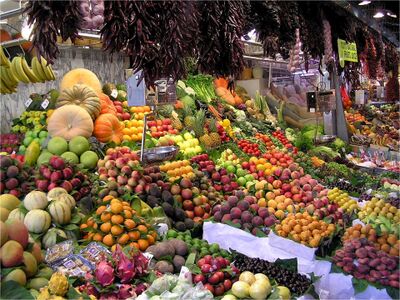Difference between revisions of "Nutrition"
Conservative (Talk | contribs) (→Academic performance and nutrition) |
Conservative (Talk | contribs) (→See also) |
||
| Line 25: | Line 25: | ||
*[[Nutritional science]] | *[[Nutritional science]] | ||
*[[Calorie]] | *[[Calorie]] | ||
| + | *[[Self-care]] | ||
*[[Naturopathy]] | *[[Naturopathy]] | ||
*[[Vegetarianism]] | *[[Vegetarianism]] | ||
Latest revision as of 23:34, April 22, 2024

Nutrition is the study that deals with food (nutrients) and nourishment.
There are several nutrients that the human body needs to acquire: protein, carbohydrates, fat, vitamins, minerals and water. Other elements include fiber and micronutrients like antioxidants, trace elements, and phytochemicals.
Nutrient-dense foods are those that provide substantial amounts of vitamins and minerals and relatively fewer calories.
The first principle of a healthy diet is simply to eat a wide variety of foods. [1] A poor diet can have an injurious impact on health.
Correct food combinations result in an immediate improvement in health by lightening the load of the digestive organs; better nutrition is assured, and there is better digestion, less fermentation and putrefaction, more comfort, less distress and less gas. So-called food allergies often disappear as a result of proper food combining. [2]
Academic performance and nutrition
See also: Academic performance and nutrition
The conclusions section for the 2017 Swiss medical journal article Associations between Dietary Intake and Academic Achievement in College Students: A Systematic Review published in the medical journal Healthcare (Basel, Switzerland) states:
| “ | This review examines the current evidence base relating dietary intake and academic achievement in university and college students. Overall, results suggest that diet may be associated with academic achievement, with the majority of studies associating more favourable dietary intake with higher academic achievement. Therefore, health promotion practitioners in the university setting should consider the positive role diet may play in students’ academic achievement when developing initiatives to promote healthy eating to students. Furthermore, health promotion practitioners may utilise the findings from the review to advocate within the university setting for the need to better support students to improve their eating habits, due to the potential impact on their academic performance. However, a limited number of lower methodological quality studies were identified, and some significant limitations of the available evidence are highlighted. Further research to more accurately determine the impact of diet on academic achievement in university and college students is warranted. Future studies should consider the use of validated dietary assessment methods, comprehensive measurement of overall dietary intake, standardised assessment and reporting of academic outcomes, and appropriate adjustment of analyses for confounding factors.[2] | ” |
Wilder Research, a nonprofit research and evaluation group, notes: "Recent studies have demonstrated that nutrition affects students’ thinking skills, behavior, and health, all factors that impact academic performance. Research suggests that diets high in trans and saturated fats can negatively impact learning and memory, nutritional deficiencies early in life can affect the cognitive development of school-aged children, and access to nutrition improves students’ cognition, concentration, and energy levels."[3]
According to the Centers for Disease Control and Prevention (CDC): "Data from the 2019 national Youth Risk Behavior Survey (YRBS) show that students with higher academic grades are more likely to engage in healthy dietary behaviors compared to students with lower grades."[4]
See also
- Diet
- Nutritional science
- Calorie
- Self-care
- Naturopathy
- Vegetarianism
- Adrian Vander
- Jesus Christ, the apostles and the Mediterranean diet/Mosaic diet
External links
- Carbohydrates & Diet Information
- The American Society for Nutrition
- GLOSSARY OF TERMS
- 13 Keys to a Healthy Diet.